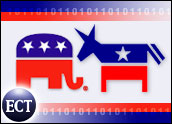
The Internet has become a key place to get news about the upcoming presidential elections, with almost a quarter of Americans now learning about the campaigns online on a regular basis.
That’s one finding from a recent survey by the Pew Research Center for the People & the Press and the Pew Internet & American Life Project on campaign news and political communication.
“2004 was supposed to be the Internet election, but it may well be that 2008 is really the year of the Internet,” Carroll Doherty, associate director of the Pew Research Center for the People & the Press, told TechNewsWorld.
Indeed, in contrast with this year’s 24 percent, only 13 percent of respondents to a similar poll during the 2004 campaign answered the same way, while during the 2000 elections only 9 percent did. Many traditional sources of news information, meanwhile, such as nightly network news and newspapers, have fallen dramatically in popularity over the same period.
“The Internet has become a ubiquitous tool for people who want to learn about anything, from what movies are showing to what the candidates are saying,” Julie Barko Germany, deputy director for The Institute for Politics Democracy & the Internet at George Washington University’s Graduate School of Political Management, told TechNewsWorld. “It’s always on, it’s individualized, and you can always get what you’re looking for.”
Wired Youth
For younger Americans, the trend is even more pronounced. The survey, which was conducted between Dec. 19 and 30 among 1,430 adults, found that a full 42 percent of those ages 18 to 29 say they regularly learn about the campaign from the Internet — making it their top news source — compared with only 20 percent in 2004.
“Even a decade after Internet news came online, we’re still seeing these age differences,” Doherty said. “It’s striking that it’s still young people leading the charge.”
People of all ages who rely on the Internet for campaign news turn to a variety of Web sites, particularly MSNBC (mentioned by 26 percent), CNN (23 percent) and Yahoo News (22 percent). Nontraditional sites also play a role, however, including the Drudge Report and MySpace — each mentioned by 3 percent — and YouTube, mentioned by 2 percent.
Once again, however, the picture is different when the focus is placed on younger respondents. Twenty-seven percent of those younger than 30 — including 37 percent of those between 18 and 24 — have gotten campaign information from social networking sites.
By contrast, just 4 percent of Americans in their 30s and 1 percent of those 40 and older said they have gotten news about the campaign in this way.
Accidental Learning
For campaign debates, speeches and commercials, television is declining while online videos are on the rise among the nation’s young. Roughly four in 10 people under 30 have watched at least one form of campaign video online, compared with only 20 percent of those 30 and over.
This is “just more evidence that the Internet has become the heartbeat of electoral politics,” Micah Sifry, executive editor of the Personal Democracy Forum, told TechNewsWorld. “We used to talk about the news cycle having a few beats over the course of the day, but now it’s continuous.”
Interestingly, however, most Web users don’t appear to go online with the sole purpose of learning about the campaign, Pew found. Rather, 52 percent say they “come across” campaign news and information when they are going online to do something else — for those under 30, that number jumps to 59 percent.
TV’s Role
The Internet may be increasing in prominence as a source of campaign news, but it’s still only a secondary one. Television remains the general public’s main source for such information, though its dominance is declining. Whereas 68 percent of respondents said they got most of their election news from TV (local, cable and network outlets combined) in the 2004 and 2000 campaigns, that figure was down to 60 percent in the most recent Pew survey.
When it comes to critical events like the primaries, however, TV’s dominance grows. For news about the Iowa primaries, for example, about 30 percent of respondents to a separate survey said they followed the news on the night it happened — 26 percent via TV news, and only 3 percent via the Internet, Doherty said.
“I would expect that on the night of the primary, you’re getting people who are interested in politics, so there may be age differences there,” he explained. Nevertheless, “it’s interesting that there’s still this role for TV.”
The Candidates
There’s no doubt voters are learning about the political candidates online. Are the candidates responding?
“I think the candidates understand that they have to deal with an instantaneous news environment,” Sifry said. “They use it constantly to stay on top of what’s going on and to communicate with the press.”
What’s less clear is that the candidates understand just how distributed politics have become online, Sifry added. Those with the best grasp of this issue on the Republican side are Mike Huckabee and Ron Paul; on the Democratic side it’s Barack Obama, he said.
“The campaign is no longer run just from your bus or headquarters — it’s also not something that is driven only by centralized purchases of TV advertising time,” Sifry explained. Rather, “the campaign now is a much more distributed phenomenon, happening on people’s screens all over the country.”
Candidates need to “share some power with their supporters to make them more effective messengers and mobilizers — but that’s not something every campaign is comfortable with,” he concluded.
Looking ahead, it seems the Internet’s role in the election process will only grow — and enter the mobile domain. “For the next election,” Germany predicted, “the mobile Internet will be just as ubiquitous as the regular Internet is today.”





















































